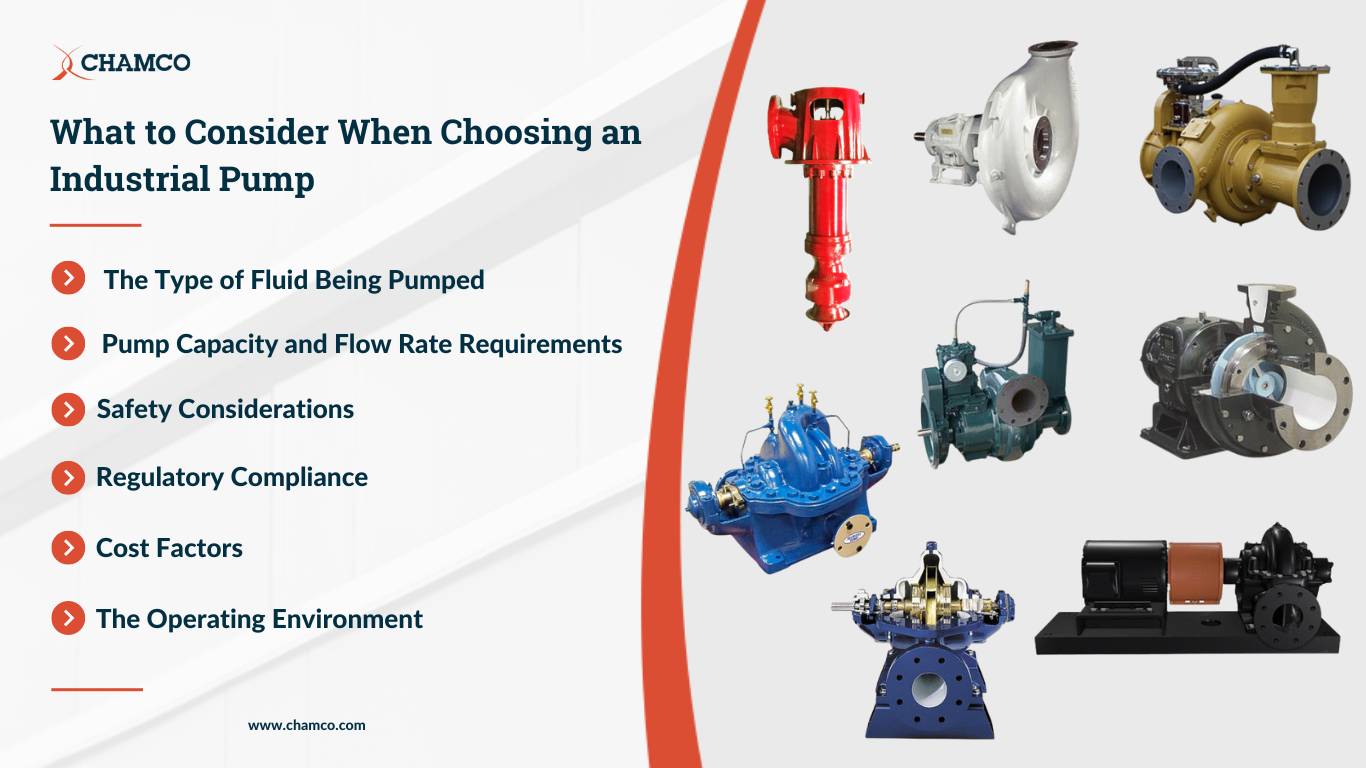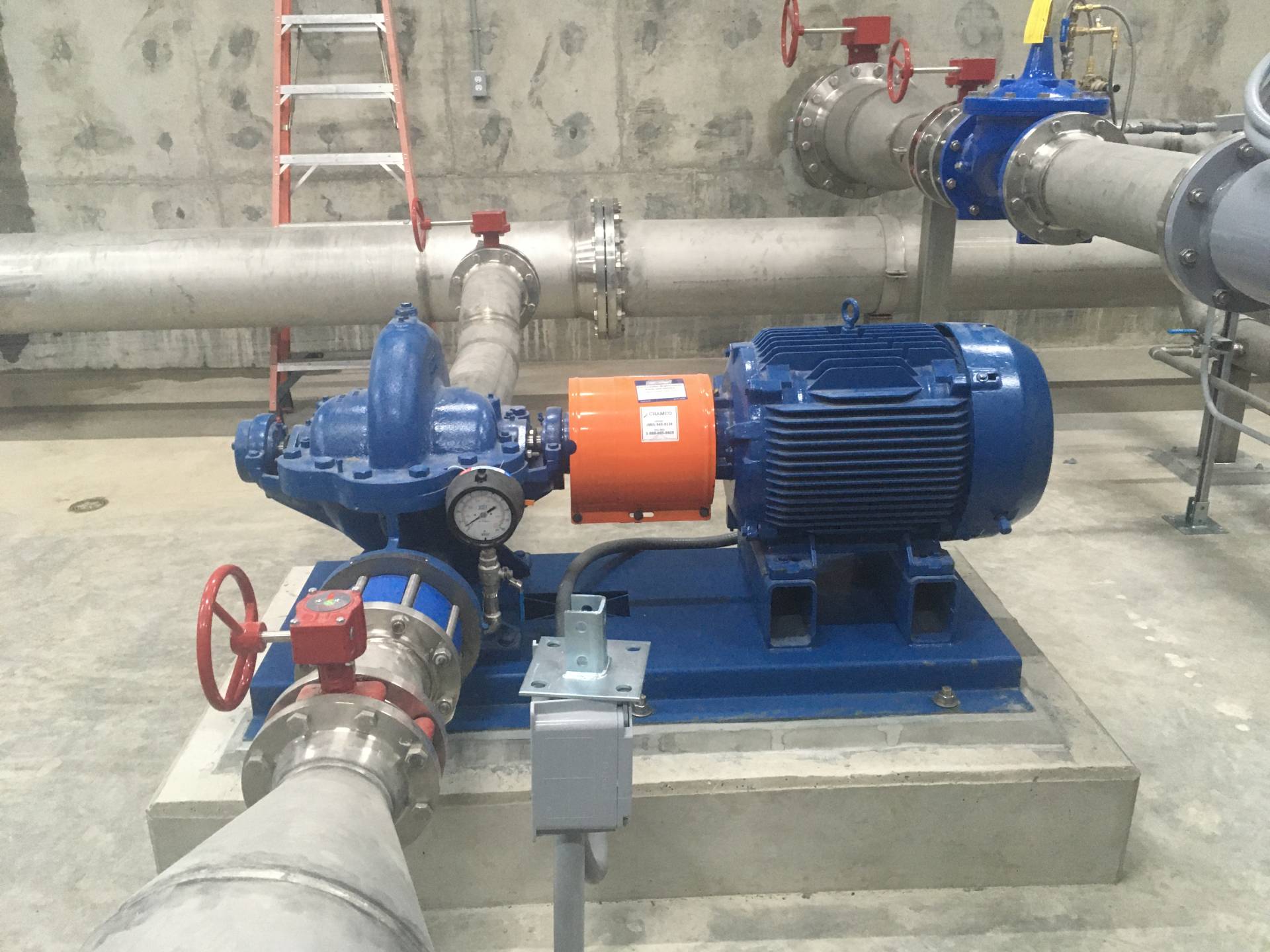Selecting the right pump for your industrial application is an important decision that impacts your operation’s efficiency, productivity, safety, and cost-effectiveness.
An improperly sized or mismatched pump type may struggle with inadequate flow rates or insufficient pressure, failing to meet the system’s demands. On the other hand, an oversized pump will deliver more flow than the system requires, leading to excess flow and higher backpressures when throttled. When the pump operates outside its optimal performance range, it can lead to increased wear and tear, energy inefficiency, excessive noise and vibration, frequent breakdowns, and a shortened lifespan.
Our guide below provides an overview of the factors you need to consider to make an informed pump selection for your operation.
Factors to Consider When Choosing an Industrial Pump
There are a number of factors to consider when it comes to choosing the right type of industrial pump for your application.

The Type of Fluid Being Pumped
Understanding the specific fluid you will be pumping is the foundational step in selecting the right pump.
The type of fluid—whether it’s water, oil, chemicals, or slurry—affects the choice of pump. Each fluid type has different characteristics that influence the pump’s design, such as viscosity, corrosiveness, and the presence of solid particulates.
For example, thicker fluids might require centrifugal pumps with more robust handling capabilities, while corrosive fluids may require diaphragm pumps made from special materials that can resist deterioration.
Don’t forget to factor in the fluid temperature. Overlooking the fluid temperature can lead to serious consequences for your pump’s operational life—what should last a decade might succumb to cavitation in just a year if the temperature is not accounted for properly.
Pump Capacity and Flow Rate Requirements

Understanding your flow and pressure requirements is essential when selecting an industrial pump. You want to ensure that the pump you choose can handle your system’s specific demands.
The pump must be capable of handling your application’s specific flow requirements to ensure efficient operation.
Pressure requirements are also crucial; the pump must generate the necessary pressure to move the fluid at the required rate.
Together, these elements determine the appropriate pump configuration and size, ensuring that your system operates effectively and meets all operational demands.
Here are some examples of pumps and their flow and pressure capabilities:
- Centrifugal pumps: Widely used for water supply and where large volumes of fluid need to move quickly, centrifugal pumps can efficiently handle moderate to high flow rates with relatively low pressure. However, their efficiency drops significantly at high pressure, making them less suitable for applications requiring high head pressure.
- Positive displacement pumps: These pumps excel in applications needing precise volumetric flow control, regardless of the system pressure. They are ideal for handling viscous fluids or where the flow rate needs to remain constant even when system pressures vary.
- Diaphragm pumps: These pumps are often used in the chemical and pharmaceutical industries. They can handle corrosive or hazardous fluids at relatively low flows but high pressures.
Safety Considerations
It goes without saying that safety is important when it comes to choosing a pump. The right pump must be able to handle the operational load and be equipped with the necessary safeguards to protect operators and the environment.
The pump and its components should be shielded to prevent accidents, and all installations must comply with regulatory standards.
The pump should also be compatible with the system’s pressure to avoid overpressurization, which can lead to leaks or ruptures.
Regulatory Compliance
Pumps in commercial and industrial applications must adhere to local and national regulations, including environmental protection, safety, and health standards.
For example, pumps used in emergency fire suppression systems for industrial and commercial buildings must adhere to NFPA regulations, while pumps used in a potable water application or municipal system must ensure that the materials in contact with the water are safe and non-toxic, as specified by local municipal regulations.
Choosing a pump that ticks all the regulatory boxes is key—not just to steer clear of legal headaches, but also to keep your operations running smoothly and safely.
Cost Factors
The initial purchase price of your pump is only part of the cost consideration when selecting a pump for your application.
You should also consider the ease of installation, compatibility with your existing systems, and long-term maintenance costs. Choosing the right pump from the start can reduce outlays for retrofitting or extensive modifications later on.
The Operating Environment
Pumps operating in extreme environments must be specially designed to handle the conditions.
High or low temperatures can affect pump performance by altering fluid characteristics or damaging components.
For example, extremely high temperatures can reduce the net positive suction head available to the pump, increasing the risk of cavitation.
Pumps in very cold climates must prevent fluid freeze, which might necessitate heated enclosures or other freeze-protection strategies.
How Chamco Can Help You Choose the Right Industrial Pump for Your Application
Selecting the right industrial pump is a critical decision that has far-reaching implications for the efficiency, reliability, and safety of your entire operation.
At Chamco, we understand the complexities involved in choosing the perfect industrial pumps. With over sixty years of expertise in the pumping industry, our dedicated team of specialists is here to guide you through every step of the process.
Contact us today to discuss how we can assist you in selecting the right pump for your application.